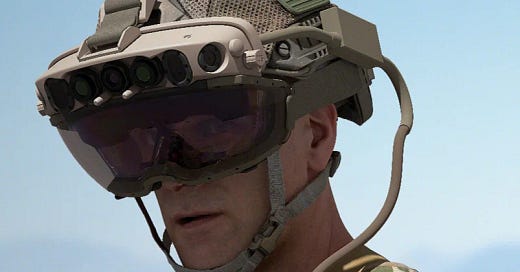The unlikely alliance between Meta and Anduril
Facebook's parent company partners with the controversial startup to equip US soldiers
In 2017, Mark Zuckerberg did not hesitate to fire Palmer Luckey, the founder of virtual reality headset maker Oculus, which he had acquired for $2 billion three years earlier. Now, he appears all smiles next to him. Last week, Meta officially announced a partnership with startup Anduril to develop augmented reality glasses for U.S. soldiers.
This alliance, unthinkable just months ago, symbolizes a radical shift for Facebook's parent company. Not only is it moving closer to Trump’s political orbit—Palmer Luckey is a longtime supporter of the US president, as is Peter Thiel, Anduril’s main investor—but it also now seeks to work with the military, a subject long considered taboo in Silicon Valley.
“Soldier-borne mission command”
Palmer Luckey founded Anduril just months after being fired—a dismissal which, according to him, was politically motivated. His goal was to reconcile cutting-edge technology with national defense. On one side, traditional defense contractors lack expertise in AI and robotics. On the other, tech giants have long shied away from military projects, often under pressure from employees.
Initially, Anduril focused on surveillance systems for the US border protection agency. Since then, it has expanded its product line to include fully autonomous drones and autonomous submarines. The company has already signed contracts with the US Air Force and the US Navy, undercutting competitors by using consumer-grade electronics.
With Meta, Anduril is now targeting another, potentially massive, contract from the US Army. The project aims to design a “soldier-borne mission command” system. In other words, an augmented reality device integrated directly into combat helmets, giving soldiers access to key battlefield information, such as maps. It must also include thermal and infrared sensors to help detect enemies, and allow troops to operate or interface with drones remotely.
Meta brings its hardware innovations
Originally, the project was awarded to Microsoft, but its HoloLens headset failed to deliver. That contract is now back up for grabs. Earlier this year, Anduril already secured part of it.
To succeed where the Windows maker failed, the two partners are betting on their respective strengths. Anduril contributes its military software platform and AI algorithms. Meta brings its hardware innovations, showcased last year in its Orion smart glasses project. These include silicon carbide lenses offering an unmatched field of view and a neural wristband that detects electrical signals from forearm muscles to allow interface control via finger movement.
For Meta, the alliance with Anduril could be a lifeline for its Reality Labs division, which has been developing these technologies. Over the past five years, it has burned through more than $70 billion—with little to show in terms of viable commercial products.




